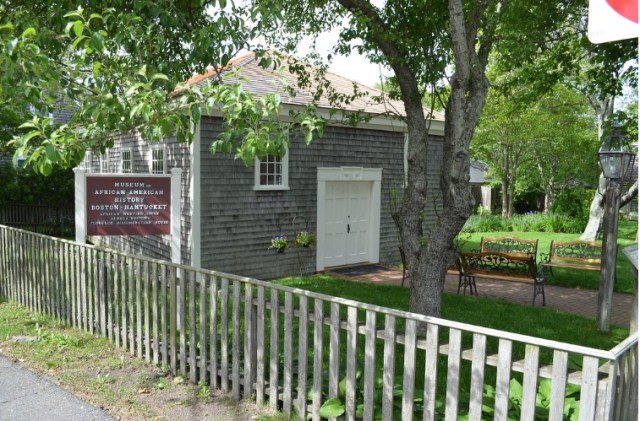In the Northeast, you don’t have to go that far before you run into history. And the Northeast is full of historic sites that celebrate Black stories and culture.
The Amistad
The Amistad, which sails up and down the Long Island Sound between New Haven, Bridgeport and New London, Connecticut, is a replica of the original Spanish schooner La Amistad where the 1839 uprising took place. In the winter months, you can find it docked on the wharf at the Mystic Seaport Museum. The floating classroom outlines the slave rebellion, the landmark Supreme Court case that followed and the history of the civil rights movement from 1841 to the present.
While you’re in the area, you can check out other sites that played a role in the case, like the Austin F. Williams Carriagehouse and House, the First Church of Christ and the New Haven Green. There’s also an Amistad memorial in New Haven, which depicts uprising leader Sengbe Pieh (also known as Joseph Cinque) and honors the brave African people who took part in the rebellion.
Harriet Tubman National Historical Park
After spending about a decade in Ontario, Canada, former slave turned American abolitionist Harriet Tubman moved back to the U.S. and settled in Auburn, New York, with her family. The Harriet Tubman National Historical Park consists of Harriet Tubman’s home, the Harriet Tubman Visitor Center, the Tubman Home for the Aged and the Thompson Memorial African Methodist Episcopal Zion Church.
The Tubman Home for the Aged was a home for elderly African Americans that Tubman herself opened, and where she lived from 1911 until her death in 1913. The Thompson Memorial African Methodist Episcopal Zion Church was the church she attended while living in Auburn.
While you’re in Auburn you can also visit the Fort Hill Cemetery, where Tubman is buried, and pay your respects.
Niagara Falls Underground Railroad Heritage Center
New York is full of sites that played important roles in the Underground Railroad. The Niagara Falls Underground Railroad Heritage Center is located near the former International Suspension Bridge, a route used by many on the Underground Railroad who sought freedom in Canada.
The Heritage Center tells the story of these freedom seekers, as well as free African American residents, abolitionists and others who helped them along the way. For many, this represented the last leg of the journey, the last river to cross before they were free. At the Niagara Falls Underground Railroad Heritage Center, their stories live on.
Museum of African American History and Boston Black Heritage Trail
The Museum of African American History, which has locations in Boston and Nantucket, is New England’s largest museum dedicated to the history, culture and contributions of African Americans. Here, you can discover over 3,000 historic objects, including rare photographs, prints and artifacts.
After your visit, consider a stroll through historic buildings on the museum’s Boston Black Heritage Trail. The trail is a walking tour of pre-Civil War sites important to Beacon Hill’s free African American community. On this free guided or self-guided walking tour, you can visit sites like the Charles Street Meeting House, the George Middleton House, the Abiel Smith School and more.
W.E.B. Du Bois National Historic Site
Author and civil rights activist W.E.B. Du Bois’s familial and childhood home is memorialized at the W.E.B. Du Bois National Historic Site in Great Barrington, Massachusetts. Though the home is no longer standing, the 5-acre site offers a self-guided interpretive trail, a commemorative boulder and the original foundations of the house. You can also take the self-guided Great Barrington Walking Tour, which identifies sites around Great Barrington that were important or influential to W.E.B. Du Bois.
Ruby & Calvin Fletcher African American History Museum
Inspired by his mother’s original collection of artifacts related to African American history, Jeffrey Fletcher opened the Ruby & Calvin Fletcher African American History Museum in Stratford, Connecticut in 2021. At the museum, visitors can see a wide collection of historic artifacts ranging from the period of slavery all the way up through the civil rights movement.
The African American Museum in Philadelphia
Founded in 1976, the African American Museum in Philadelphia was the first museum built by a major U.S. city dedicated to the life and work of African Americans. The museum tracks the art, culture and history of African Americans from the pre-Colonial era to the present day. The exhibits are constantly being rotated and updated, so it’s a great museum for multiple visits. The museum focuses both on local history and the wider scope of the Black experience in America.
Have you ever been to one of these historic sites or museums? Are there any sites that we forgot to mention on our list? Let us know in the comments below!
Featured image: “Museum of African American History – Nantucket” by Massachusetts Office of Travel & Tourism is licensed under CC BY-ND 2.0.
41 Thoughts on “Northeast Historic Sites That Celebrate Black Culture”
Leave A Comment
Comments are subject to moderation and may or may not be published at the editor’s discretion. Only comments that are relevant to the article and add value to the Your AAA community will be considered. Comments may be edited for clarity and length.

















The African-American Heritage Trail on the island of Martha’s Vineyard, MA, is well worth exploring. There are currently 31 marked sites, and a variety of walking and driving tours ($30-$90) are available during the summer season. A comprehensive book ($25) elaborating on the sites is also available: Lighting the Trail: African American Heritage Trail of Martha’s Vineyard.
1. John Brown Farm State Historic Site, 115 John Brown Road, Lake Placid, NY.
2. Ulysses S. Grant Cottage National Historic Landmark, 1000 Mt McGregor Rd, Gansevoort, NY 12831. This is where he finished his brilliant memoirs of the Union Army that he led to victory.
Oh wow!!! Thank you so much!!
How could you forget Sojourner Truth in NY!?!?!?
The Royall House and Slave Quarters in Medford Massachusetts.
Albany’s Underground Railroad Education Center — they are in the process of restoring the home of a free Black couple who were involved in the anti-slavery movement and give tours and run other education programs. I went recently with friends and we all found it deeply absorbing and moving. UndergroundRailroadHistory.org, (518) 621-7793
New Jersey has many important sites that celebrate Black Culture. Paterson, NJ contains a nineteenth century site monument celebrating the Huntoon-Van Rensalier Underground Railroad home that was operated by the inter-racial partnership of Josiah Huntoon and William Van Rensalier. The site is recognized by the National Park Service “Network to Freedom.” Paterson also contains a twentieth-century stadium which is one of two remaining ballparks used by the Negro League. This stadium, at the Great Falls National Park is being rehabilitated and will soon house the NJ Jackals minor league baseball team
Visit the Black American West Museum in Denver Colorado.
Brooklyn, NY – Weeksville Heritage Site. Plymouth Church (a stop on the underground RR). Queens, NY – Lewis Lattimer House, 10 minute drive to Louis Armstrong house. Cape May, NJ Harriett Tubman museum
The Boston Black Heritage trail is well worth seeing. The tour is sponsored by park rangers. Highlights for me: The African – American church/meeting house on Beacon Hill near Cambridge St. , and the plaque across from the state house honoring the black soldiers regiment in the Civil War, (see Glory Brigade movie for more info.)
The African Burial Ground National Monument at 290 Broadway in New York City. Many times visits are by appointment.
Don’t forget Frederick Douglass! There are several sites associated with him in Rochester, NY – his gravesite in Mt Hope Cemetery and a self-guided walking tour (a website called Visit Rochester has more info). Rochester is not far from Auburn, NY (Harriet Tubman museum) and Niagara Falls (underground museum).
The david Ruggles Center and the statue to Sojourner Truth are important landmarks in Florence, Massachusetts, which was founded as an industrial, educational and socially progressive community in the 19th century a couple of miles outside of Northampton. In the middle of that century, African Americans were a larger percentage of the population than was the case in the nearby city of Springfield. From the 1850s through the rest of the century, Florence (then called Bensonville) Sojourner Truth lived here, Frederick douglass and other abolitionist leaders spoke here.
Ulster County,NY is filled with history of black culture. Sojourner Truth’s life walk is happening this Saturday,Feb. 18 in Kingston,N.Y.
The David Ruggles Center in Northampton, Mass does a great Sojourner Truth Tour
It’s not strictly North East, but I would highly Recommend Booker T. Washington Nat’l Monument in Hardy, Virginia, Franklyn County just south of Roanoke. It is Booker T’s birth place. It is a 205 acre working farm where he was born. I worked there during my summers in college. I loved it and learned so much about him.
The Royall House and Slave Quarters in Medford Mass is very powerful. It is the only existing slave quarters building above Baltimore in the northeast. It recently received $500,000 from the Harvard Law School.